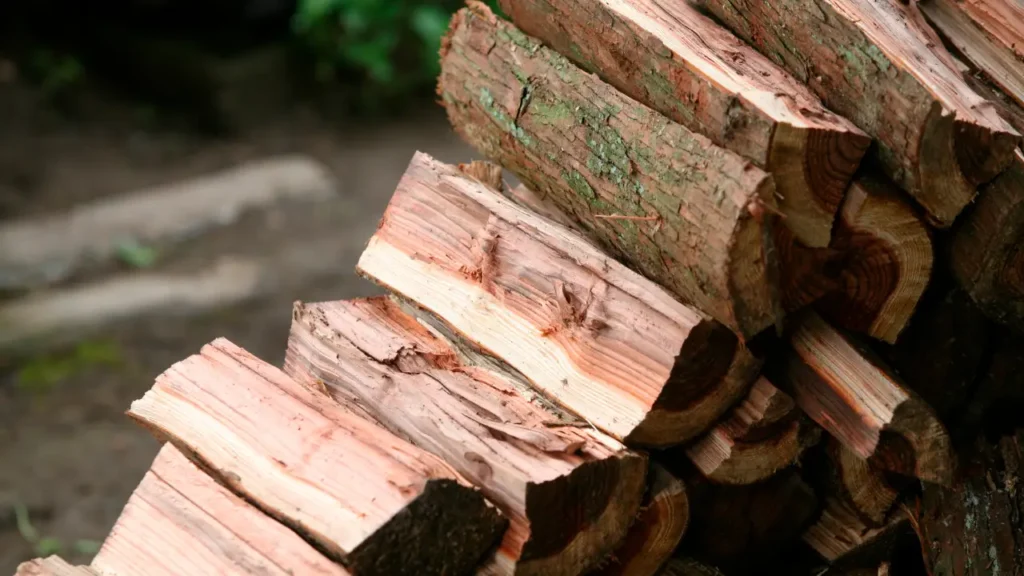When it comes to heating your home with wood, understanding firewood measurements is crucial. You might have heard terms like “cord,” “rick,” and “face cord,” but without clear guidance, these can be confusing.
The way firewood is stacked and measured affects how much wood you get, and ultimately, how much heat you’ll have through the cold months.
Here, we’ll dive deep into understanding the measurement of firewood, particularly focusing on the relationship between a rick and a cord, so you can make informed decisions for your firewood needs.
How Many Ricks in a Cord?
For standard 16-inch logs, a rick makes up about 1/3 of a cord, or roughly 42.67 cubic feet.
A rick of wood often called a face cord is a common way to measure stacked firewood. Generally, a rick is 4 feet high and 8 feet long, but its depth depends on the length of the firewood logs. For standard 16-inch logs, a rick makes up about one-third of a cord, or roughly 42.67 cubic feet.
How much does a rick of wood cost? Expect to pay between $70 and $120 for a rick of seasoned firewood, although prices vary based on wood type and local market trends. In colder months, prices may increase due to higher demand.
How heavy is a rick of wood? The weight of a rick can range widely, from about 625 to 2,750 pounds, depending on the wood type (softwood or hardwood) and whether it’s seasoned or green.
| Measurement Type | Dimensions (ft) | Volume (cubic feet) |
|---|---|---|
| Cord | 4 x 4 x 8 | 128 |
| Rick (Face Cord) | 4 x 8 x 1.33 (16 in logs) | ~42.67 |
What is a Cord of Wood?
A cord is the standard unit for measuring firewood in North America. It’s a neatly stacked pile of wood measuring 4 feet high, 4 feet deep, and 8 feet long. This results in a total volume of 128 cubic feet. The wood within a cord may vary in shape, length, and type, but the stacked dimensions remain consistent.
- Full Cord Dimensions: 4 feet high x 4 feet deep x 8 feet long
- Volume: 128 cubic feet
- Purpose: Used as the baseline measure in firewood sales
This standard size ensures that buyers and sellers have a consistent, universally understood measurement. However, in practice, logs may be shorter or vary in size, which introduces other measurements, like the rick.
How Many Ricks Are in a Cord?
Typically, three ricks equal one full cord when logs are cut to 16 inches in length. Since a cord measures 4 feet in depth, or 48 inches, three stacks of 16-inch logs (or three ricks) will fill that depth.
- For 16-inch logs: 1 cord = 3 ricks
- For 12-inch logs: 1 cord = 4 ricks
- For 24-inch logs: 1 cord = 2 ricks
Since firewood is often cut to 16-inch lengths for easy handling, this measurement becomes a practical standard. However, always confirm with your supplier about log length to ensure you’re getting the desired volume.
Comparing Face Cords, Full Cords, and Ricks
| Measurement | Typical Depth | Length | Stacked Height | Volume Approx. |
|---|---|---|---|---|
| Full Cord | 4 ft | 8 ft | 4 ft | 128 cu ft |
| Face Cord | 16 in | 8 ft | 4 ft | ~43 cu ft |
| Rick | Varies | 8 ft | 4 ft | Depends on depth |
How Much is A Rick of Firewood?
| Firewood Type | Log Size (inches) | Seasoned Price per Rick (USD) | Wet Price per Rick (USD) |
|---|---|---|---|
| Oak | 16-18 | $150 – $250 | $100 – $180 |
| Hickory | 16-18 | $175 – $275 | $120 – $200 |
| Maple | 16-18 | $125 – $200 | $90 – $150 |
| Cherry | 16-18 | $150 – $250 | $110 – $180 |
| Pine | 16-18 | $100 – $175 | $70 – $120 |
| Ash | 16-18 | $130 – $220 | $90 – $160 |
| Birch | 16-18 | $140 – $230 | $100 – $170 |
| Pecan | 16-18 | $160 – $260 | $120 – $190 |
Why Does the Size of Logs Matter?
Log size plays a major role in firewood quantity. Shorter logs mean more logs per rick, but they also mean more space between the logs when stacked, affecting total volume.
Longer logs, like 24-inch cuts, mean fewer ricks per cord but are often used for larger stoves and longer burning times.

How Stacking Style Affects Measurements
The way you stack firewood can alter its final volume. Well-stacked wood has minimal gaps, while loosely piled wood takes up more space.
Traditional stacked rows are ideal for ricks, while crisscrossed or mixed patterns are less efficient for measuring purposes.
Buying Firewood: What to Ask Your Supplier
When purchasing firewood, clarify terms with your supplier. Important questions to ask include:
-
“How long are the logs in this rick?”
-
“Is this rick equivalent to a third of a cord?”
-
“What type of wood is included in the rick or cord?”
Knowing these details prevents surprises and ensures you get the right volume.
Stacking Techniques for Maximum Efficiency
To maximize space and ensure your firewood lasts longer, consider these stacking tips:
-
Stack in rows, keeping each row 4 feet high and 8 feet long.
-
Allow airflow between rows to prevent moisture buildup.
-
Cover only the top to prevent rain from seeping in.
Affiliate Disclosure: Fireplaceadviser.com is a participant in the Amazon Services LLC Associates Program. We may earn a commission when you click on certain links on this site and purchase.

Hello!! I am Jamal Khan. I often fix my home electric heaters and gas stove problems and research the common issues in the heating units to improve my knowledge and expertise. The aim of establishing fireplaceadviser.com is to share my expertise and knowledge with my audience.












